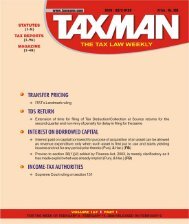news round up - Taxmann
news round up - Taxmann
news round up - Taxmann
- TAGS
- news
- round
- taxmann
- taxmann.com
Create successful ePaper yourself
Turn your PDF publications into a flip-book with our unique Google optimized e-Paper software.
120 GOODS & SERVICES TAX - MAGAZINE [Vol. 1<br />
� In case of s<strong>up</strong>plies of services, e.g., consulting services, sport and<br />
entertainment events.<br />
A foreign non-resident trader is required to appoint a Japanese resident<br />
tax agent. The agent is responsible for all communications between the<br />
company and the Japanese tax authorities.<br />
Once a company becomes a taxable business, it is required to file periodic<br />
CT returns. The frequency of these depends on the trader’s turnover. The<br />
tax filing lists all of the company’s transactions related to the s<strong>up</strong>ply of the<br />
relevant goods or services. Any CT due should be paid simultaneously with<br />
the filing of the tax return. The tax authorities will require payments of CT<br />
liabilities to be made in Japan at an authorized bank or post office. In the<br />
case of a tax credit (where the CT incurred by the company exceeds the<br />
CT charged on its sales in the reporting period), documentary proof<br />
related to the transactions is often requested by the tax office.<br />
Summing <strong>up</strong><br />
3. The foregoing account regarding the functioning of GST in six countries<br />
shows that the conceptual framework of the tax is the same as is being<br />
thought of in India. It would facilitate a streamlined law for India, if the<br />
New Zealand’s practice of studying the other countries laws is adopted<br />
and based on their experience, a robust well drafted GST legislation is<br />
introduced leaving little room for ambiguities and misinterpretations<br />
which generate litigation. However, multiple legislations, one for the<br />
Central Government and others for the States seems to have become fate<br />
accompli for India in view of the recommendations of the Empowered<br />
Gro<strong>up</strong> of State Finance Ministers (EG) and Task Force for GST of the<br />
Finance Commission. Even Finance Minister in his budget speech for the<br />
year 2009-10, in para 85 has said :—<br />
“. . . The broad contour of the GST model is that it will be a dual GST<br />
comprising of the Central GST and the State GST. The Centre and the States<br />
will each legislate, levy and administer the Central GST and State GST<br />
respectively. . . .”<br />
Duality in GST is bound to bring complexities in designing such a tax and<br />
in its implementation.<br />
Most countries have unified GST regime. But some countries like Brazil<br />
and Canada follow the dual system of taxation. Because of the system<br />
being dual, Canada had to face many problems in implementing such a<br />
system. India need to benefit from the Canadian experience so that similar<br />
problems may not crop <strong>up</strong> here.<br />
Even after the report of the EG, there is no clarity in certain matters. For<br />
example, it is found that it is a common practice to have single composite<br />
contracts for various works, jobs, services, etc., such as in case of engineering<br />
projects, construction contracts, EPC projects, installation and erection<br />
projects, software and information technology, etc. The issue that can<br />
GOODS & SERVICES TAX CASES ❑ JANUARY 20 - FEBRUARY 4, 2010 ◆ 30











![“FORM NO. 3CEB [See rule 10E] Report from an ... - Taxmann](https://img.yumpu.com/45480232/1/190x245/form-no-3ceb-see-rule-10e-report-from-an-taxmann.jpg?quality=85)





